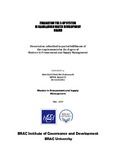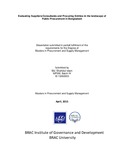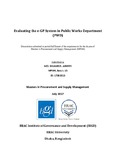Procurement practices in BRAC procurement guidelines and implementation procedures
Abstract
NGOs in Bangladesh, originally formed to combat poverty, are facing issues of corruption and deviation from their mission, according to Transparency International Bangladesh. To align with Sustainable Development Goals (SDGs), NGOs must transform by emphasizing partnerships, innovation, specialized services, empowerment, and financial sustainability for long-term impact.
In 1971, Sir Fazle Hasan Abed founded BRAC to support the newly independent Bangladesh, beginning relief efforts in northern Bangladesh's Sulla region, which included building homes, distributing tools and seeds, and addressing diseases like diarrhea, tuberculosis, and malaria. BRAC also provided cattle loans, leading to household dairies and a nationwide distribution network. They formed agricultural and craft cooperatives to benefit villages and empowered women through various initiatives.
Today, BRAC is a prominent development organization with over 100,000 employees across Asia and Africa, impacting over 100 million lives. Their programs have helped 14 million people overcome extreme poverty, educated 15 million students, and provided over US$4.7 billion in microfinance loans to more than 8 million clients.
BRAC implements stringent procurement policies to adhere to donor restrictions and maintain the ethical utilization of donor funds. These policies are threshold-based and prioritize transparency and control, resulting in a more bureaucratic process. To enhance transparency, traceability, and monitoring of expenditures, BRAC has implemented an integrated procurement system. This system helps mitigate the risk of fraud and improves cost control.
Keywords
Procurement process; BRAC procurement guidelines; NGO; Non-governmental organization; BRAC International; Integrated procurement systemDescription
This internship report is submitted in partial fulfillment of the requirements for the degree of Masters in Procurement and Supply Management, 2023.Department
BRAC Institute of Governance and DevelopmentType
Internship reportCollections
Related items
Showing items related by title, author, creator and subject.
-
Evaluating the e-GP system in Bangladesh Water Development Board (BWDB)
Md. Ruhunnabi, Abdullahil Baki (BRAC University, 2015-05)Government of Bangladesh has implemented Electronic Government Procurement (e-GP) solutions in 2011 for its procurement as a step towards digital Bangladesh. Since then e-GP has brought a change in the businesses process ... -
Evaluating suppliers/consultants and procuring entities in the landscape of public procurement in Bangladesh
Islam, Md. Shahidul (BRAC University, 2015-04)Promoting good corporate governance to the business community (suppliers/ consultants) and procuring entities in order to build professionalism about procurement issues is a latest challenge in the field of Public ... -
Evaluating the e-GP System in Public Works Department (PWD)
Arefin, Md. Shamsul (BARC University, 2017-07)Electronic Government Procurement (e-GP) is the application of an efficient high quality management framework to public sector procurement, facilitated through online information and processes. e-GP solutions make purchasing ...




